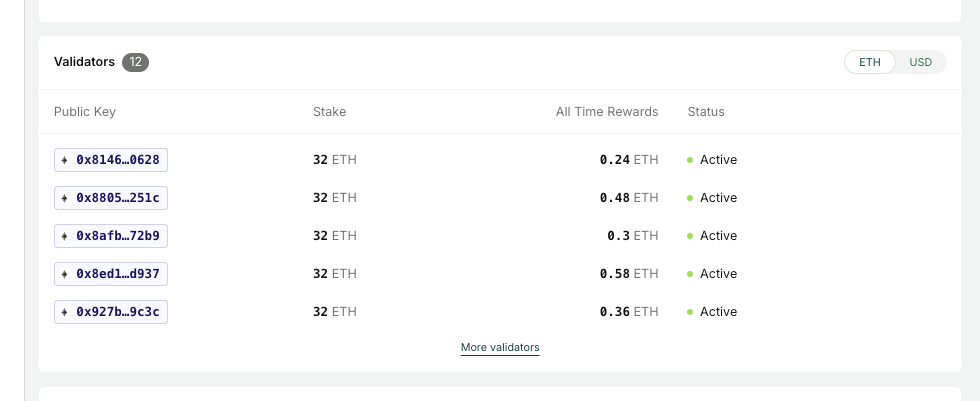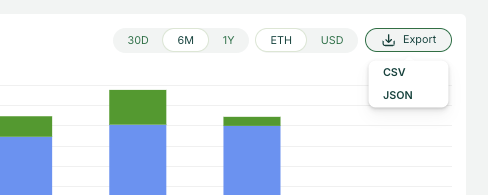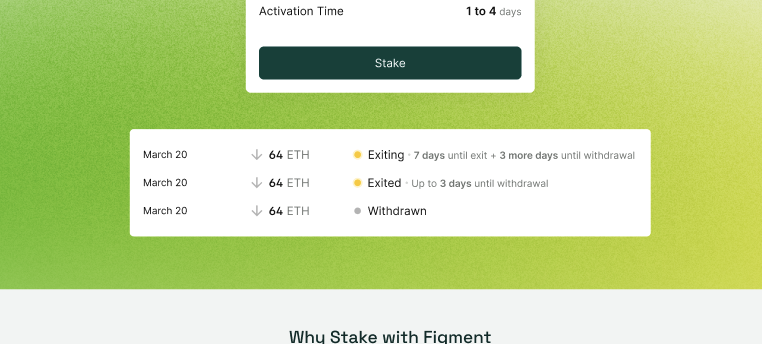Ledger Wallet ETH FAQ
Staking
Is Figment running Pectra validators?
Yes. We rolled out staking to Pectra validator on November 6th 2025. Any stake prior to that would have been deposited in 0x01 validators and any stake after that would have been deposited in 0x02 validators.
How long does it take for a validator to become active?
This activation estimate varies depending on how many validators are activating at any given time. It's usually a few days but in period of surging demands, can go up to a few weeks. The latest number can be found on the Validator Queue website
Can I see a list of my validators?
Your validators are listed on the Rewards tab, with their staked balance, all time rewards and status. Clicking on their address will take you to the Beacon Chain block explorer.

Pectra Upgrade
The Pectra upgrade introduced a new type of Ethereum validator, usually referred to by it's credential prefix: 0x02, in contrast with the 0x01 prefix of Ethereum validators until then.
0x02 validators (or Pectra validators) differ from 0x01 (or legacy validators) in a few ways:
- Compounding: With legacy validators, any balance above 32 ETH gets swept back to the withdrawal address every 10 days on average. In Pectra validators, that doesn't happen until the validators balance reaches 2048 ETH. Until then the CL rewards compound.
- Topups and Withdrawals. With legacy validators you couldn't increase the validator's stake or take some ETH back if you wanted to. You can now do that with Pectra validators. Add ("topup") or remove ("withdrawal") any amount once your validator is active.
- No more multiples of 32 ETH. With legacy validators, you could only stake by multiples of 32 ETH. Now you can stake 33 ETH, or 45 ETH. Any amount above 32 ETH works.
Here's a table to recap:
Legacy (0x01) | Pectra (0x02) | |
|---|---|---|
Max Effective Balance | 32 ETH | 2048 ETH |
Compounding | ❌ | ✅ |
Top-up | ❌ | ✅ |
Withdrawals | ❌ | ✅ |
ETH amount | ❌ | ✅ |
Rewards
A 1 minute primer on ETH rewards
An ETH validator performs two main duties: attestations and block proposals.
- Attestations are like votes on the state of the chain and help the network arrive at consensus. Rewards for those are small (~ 0.002 ETH/day) and frequent (every few minutes). They are only distributed on the Consensus Layer.
- Block proposals are more rare (a validator proposes a block every four to six months on average) but rewards are usually higher. Block proposal rewards are distributed on both the Consensus Layer (the block proposer rewards) and on the Execution Layer (the tips and MEV).
Based on the above, we can distinguish rewards based on the layer they are earned on. This is important because they will be received by your wallet at different times.
- Consensus Layer (CL) rewards.
- If you have 0x01 validators, they do not go immediately in your wallet. As your validator earns them they accrue and, every ~ 10 days, the Ethereum protocol automatically sends them to your wallet as a "sweep".
- If you have 0x02 validators, they also accrue on your validator balance, but they stay there and compound. They are not automatically swept. Until you reach 2048 ETH.
- Execution Layer (EL) Rewards. They go immediately to your wallet after being earned. They go through a smart contract where they are split so that Figment can take its fee. More below.
How often are CL rewards paid?
- For legacy validators, they accrue on your validator's balance until they are automatically swept to your wallet. So although you are earning rewards every few minutes, you only receive them in your wallet by chunk every ~ 10 days or so.
- For Pectra validators, they accrue and stay on your validators. They don't hit your wallet until you manually withdraw them.
How often are EL rewards paid?
Those are completely random and cannot be predicted.
Do I need to claim rewards?
- For legacy validators, no. They are automatically swept to your wallet.
- For Pectra validators, yes. You can withdraw them anytime after the validator is active
Can I download a history of my rewards?
Yes. The rewards chart has a way to download the rewards you see on the chart. Pick the duration you want (39 days, one year, etc) and download them in CSVor in JSON.

You can get more granularity and date range using our API. Get in touch with us if you want to be set up with API access.
Unstaking
How soon can I unstake my ETH?
The Ethereum protocol only allows you to exit a validator once 256 epochs (~ 27 hours) have passed since it became active.
How long does it take to unstake my ETH?
There are two parts in unstaking:
- Exit. Your validator enters the exit queue but is still earning rewards. This usually lasts a few days but in period of surging demands it can go up to a few weeks.
- Withdrawal. Your validator has exited and is not earning rewards anymore. It's waiting for the protocol to withdraw its balance back to your wallet. This can take anywhere between 1 and 10 days
To know what is the size of the exit queue at any given time, have a look at the Validator Queue
After you unstake, we provide clear status and estimates in the Activity table:

Fee
How Figment take a fee on rewards?
Figment does not take any cut from CL rewards. Doing so would mean assigning your validator's withdrawal credentials to a smart contract, which means we would have control of your funds. Any solution that does that has control of your funds in practice. With Figment, your validator's withdrawal credentials are always assigned to your wallet.
Figment only take a cut from the EL rewards. We deploy a smart contract (unique for your wallet) and we set the validator's fee recipient (where EL rewards go) to this contract. When EL rewards are earned, they go through this contract that splits them between Figment and you.
The way we split rewards is dynamic and is determined by the share of EL rewards in the mix of all rewards.
Why does Figment's fee look lower/higher than 8%?
Because of the variability of EL rewards, at any point in time the effective fee Figment takes could be different than 8%:
- if you just started staking a few weeks ago and your validators haven't proposed a block yet, you will have kept 100% of rewards and Figment's fee would be 0%
- if you get lucky and quickly get an EL reward on which Figment takes a cut, our effective fee will be higher than 8%. But as time goes by and you keep getting CL rewards (on which Figment doesn't take a fee) the effective fee we take will go back down to 8%
Misc
Can I view my Ledger Wallet stakes in the Figment app?
Yes! Once you have created a Figment app account, you can view your Ledger Wallet stakes there. You will just need to import them on this page https://app.figment.io/ethereum/mainnet
Can I restake on EigenLayer?
It is not currently possible to restake on EigenLayer on Ledger Live. You can use the Figment app to do that.
Updated about 2 months ago
